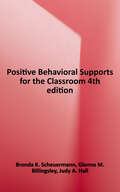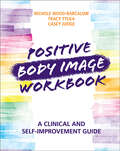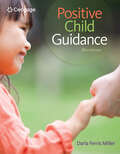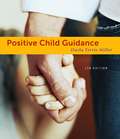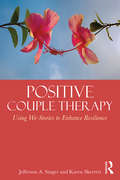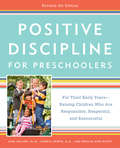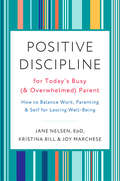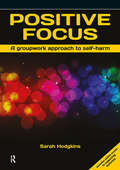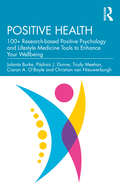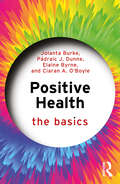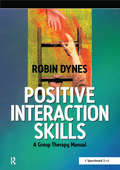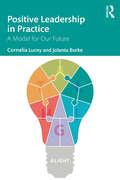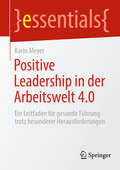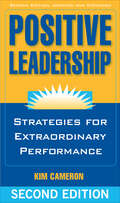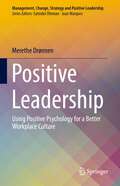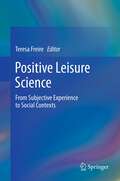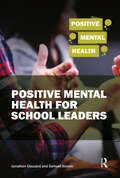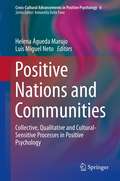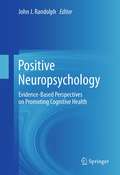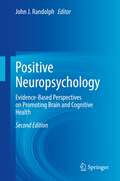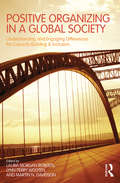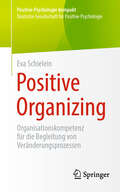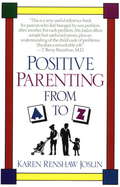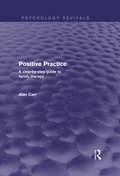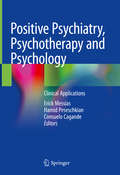- Table View
- List View
Positive Behavioral Supports for the Classroom, Fourth Edition
by Brenda K. Scheuermann Judy A. Hall Glenna M. BillingsleyThis book covers foundational principles and practices from applied behavior analysis. It includes the latest research and practices from the field of positive behavior interventions and supports. The text emphasizes a multi-tiered support system for developing positive behaviors in children and youth. A wide variety of concepts and techniques are examined. The authors' relaxed, user-friendly writing style makes the book appropriate for everyone. The 4th Edition features updated research and recent developments in the field. It places extra focus on preventing challenging behaviors. You'll learn how to manage challenging behaviors effectively school-wide, in classrooms and for individual students.
Positive Body Image Workbook: A Clinical and Self-Improvement Guide
by Tracy Tylka Nichole Wood-Barcalow Casey JudgeThis clear and easy-to-use workbook provides clinicians, clients, and those interested in self-improvement with a practical guide to understanding and improving body image through the latest research findings and clinical tools. The key components of positive body image, such as embodiment, body appreciation, self-care, intuitive eating, social comparison, and body talk, are all covered, with reliable assessments and guidelines for applications accompanying each topic. An array of assignments are also included for clients and readers to complete based on their values, needs and interests to provide positive body image. Clinicians will appreciate the practical treatment planning sections (including talking points for sessions, goals and objectives) to assist in clinical interventions. Additionally, a specific chapter is devoted to how clinicians can prepare themselves both professionally and personally for body image work.
Positive Child Guidance
by Darla Ferris MillerPOSITIVE CHILD GUIDANCE, Eighth Edition, equips readers with information on how to guide, manage, and cope with the behavior of children. The book provides insight into children's efforts to understand their own emerging needs and feelings while coping with adult expectations. The author outlines workable steps for creating a cooperative, respectful community of children and adults, with special emphasis on sensitivity to cultural needs, cultural differences, and developmentally appropriate practice. You'll also find a range of practical, effective, and flexible guidance strategies based on principles of straightforward communication and assertiveness. This new edition includes critical advances in research and addresses the cultural trends that are changing the way babies and children are cared for today.
Positive Child Guidance (Seventh Edition)
by Darla Ferris MillerPositive Child Guidance, Seventh Edition is ideal for guidance, behavior management and discipline, and classroom management courses in an early childhood education curriculum. This practical book outlines workable steps for creating a cooperative, respectful community of children and adults with special emphasis on sensitivity to cultural needs, cultural differences, and developmentally appropriate practice.
Positive Couple Therapy: Using We-Stories to Enhance Resilience
by Jefferson A. Singer Karen SkerrettPositive Couple Therapy: Using We-Stories to Enhance Resilience is a significant step forward in the couple literature. Utilizing a strengths-based approach, it teaches therapists and couples a unique method for uncovering positive potential within a relationship. The authors demonstrate how “We stories”–created, recovered and made anew–provide essential elements of connection. With vivid imagery, these stories capture the couple’s sense of “We-ness,” highlighting memorable moments of compassion, acceptance, and respect. A shared commitment to the “We” simultaneously builds the relationship and enables each individual in the partnership to feel a greater degree of both accountability and autonomy. Couples that can find their stories, share them with each other, and then carry them forward to family, friends, and a larger community are likely to preserve a sense of mutuality that will thrive over a lifetime of partnership. Positive Couple Therapy provides simple and practical instruction for reclaiming positive stories that can catalyze hope in relationships that have become stressed and strained. The authors weave together cutting edge thinking and research in attachment theory, narrative therapy, neuroscience, and adult development, as well as their own research and clinical experience to present vivid case histories, step-by-step strategies, exercises, questionnaires, and interview techniques. They cover a range of contemporary couple experiences: couples in conflict, LGBT partnerships, deployed and discharged military couples, and couples at various points across the life span. The authors’ unique Me (to US) Scale, a 10-item tool that assesses the degree of mutuality a couple possesses at the start of treatment, gives therapists of any theoretical orientation the ability to put this intervention to immediate use.
Positive Discipline for Preschoolers, Revised 4th Edition: For Their Early Years -- Raising Children Who Are Responsible, Respectful, and Resourceful
by Jane Nelsen Cheryl Erwin Roslyn Ann DuffyCompletely updated with the latest research in child development and learning, Positive Discipline for Preschoolers will help parents understand their preschooler and provide early methods to raise a child who is responsible, respectful, and resourceful.Caring for young children is one of the most challenging tasks an adult will ever face. No matter how much you love your child, there will be moments filled with frustration, anger, and even desperation. There will also be questions: Why does my four-year-old deliberately lie to me? Why is everything a struggle with my three-year-old? Should I ever spank my preschooler when she is disobedient? Over the years, millions of parents have come to trust the Positive Discipline series and its common-sense approach to child-rearing.This revised and updated fourth edition includes a new chapter on the importance of play and outdoor experiences on child development, along with new information on school readiness, childhood brain growth, and social/emotional learning. You'll also find practical solutions for how to:- Teach appropriate social skills at an early age- Avoid the power struggles that often come with mastering sleeping, eating, and potty training- See misbehavior as an opportunity to teach nonpunitive discipline--not punishment
Positive Discipline for Today's Busy (and Overwhelmed) Parent: How to Balance Work, Parenting, and Self for Lasting Well-Being
by Jane Nelsen Kristina Bill Joy MarcheseWith the increasing pressure to excel at parenting, work, and personal relationships, it's easy to feel stressed and dissatisfied. This targeted Positive Discipline guide gives parents the tools to parent effectively without sacrificing their well-being or giving up on their life goals. Instead of creating unachievable expectations, you will instead learn to play to your strengths at work and at home. You’ll integrate your seemingly disparate areas of life and use Positive Discipline to make the most out of your time, energy and relationships. By helping you get to the bottom of the underlying causes of misbehavior, busy parents will also be able to avoid pampering and keep permissive and punitive parenting at bay. Instead of feeling fragmented and guilty, you’ll have the presence of mind to explore what works best for you and your family. Attitude is key – we’ll help you feel confident in your parenting abilities and your professional choices, making your children more likely to adopt an attitude of self-reliance and cooperation. Armed with communication strategies and tips for self-reflection, moms (and dads!) won't have to feel guilty about leaving their child with a sitter during the day, or leaving work early to go to a soccer game.
Positive Focus: A Groupwork Approach to Self-Harm
by Sarah HodgkinsPositive Focus introduces a seven session group work framework which has been designed to support young people who self-harm. The group aims to encourage young people to develop alternative coping strategies for dealing with their feelings, thereby reducing the need to self-harm. Each session includes topics such as; anger/anxiety management; relaxation; assertion/communication skills; distraction/channelling; problem solving; and self-control. Group members will receive printed information from the sessions to take away with them and build into a support reference. The sessions will enhance the individual's feelings of self-control and responsibility for their actions, giving them a sense of choice about how they deal with difficult situations and feelings.
Positive Health: 100+ Research-based Positive Psychology and Lifestyle Medicine Tools to Enhance Your Wellbeing
by Jolanta Burke Christian van Nieuwerburgh Pádraic J. Dunne Trudy Meehan Ciaran A. O’BoyleThis comprehensive compendium offers a wealth of research-informed tools that can boost both physical and mental wellbeing throughout the lifespan. Filled with more than 100 activities to help you live life better, this book is the first of its kind to integrate the latest research from the fields of positive psychology and lifestyle medicine. Striking a careful balance between theory and practice, the book first reviews what is known about positive psychology and health, presenting a novel approach to holistic wellbeing. It then goes on to provide more than 100 tools designed to increase physical, mental and social health and wellbeing, and also to decrease the risk of illness and disease. The tools described can be used by people of all ages, whether well or experiencing illness. It includes tools that you can use to improve your nutrition and sleep, to increase your physical activity, to develop positive relationships, to develop a positive mindset and to pursue a meaning in life. These tools provide research-informed, practical advice to help you to make lasting changes and become the best possible version of yourself. This book is invaluable for anyone who wishes to maintain and enhance their health and wellbeing using tools that have been shown through research to be effective. It is also a key text for students in positive psychology and healthcare, as well serving as an evidence-based reference book for coaches and health professionals who wish to recommend research-informed tools to their clients and patients.
Positive Health: The Basics (The Basics)
by Elaine Byrne Jolanta Burke Pádraic J. Dunne Ciaran A. O’BoyleThis introductory book offers a clear guide to the new field of Positive Health which incorporates a shift towards perceiving body and mind as an integrated system. The book combines Lifestyle Medicine research and practice, such as healthy eating, good sleep hygiene, and physical activity, with positive psychology research and practice, including cognitive, arts-based, and positive affect tools, to delve into the psychology of positive health, physiology, and health behaviour.Combining theory with interventions, and illustrated by case material, mind-maps, and infographics, the book also provides exercises on how to use key research findings from the field of positive health to enhance personal wellbeing. It helps readers focus on the changes they can make to their thinking, attitudes, and behaviours, as well as changes they can instigate in their environment that can lead to positive health. Topics covered include the social determinants of health and meaning as a factor contributing to health.It is essential for introductory courses on Positive Health, and supplementary reading for courses on positive psychology or wellbeing, as well as valuable reading for all healthcare professionals and policy makers.
Positive Interaction Skills: A Group Therapy Manual
by Robin DynesThis practical, photocopiable manual provides group leaders with a flexible programme to teach interaction skills that can be adapted to a wide variety of groups, situations and needs. The programme will benefit anyone who lacks adequate skills or who has difficulty interacting with other people at home, socially or at work, for example adults with very few or no formal qualifications, people with depression or schizophrenia, young people in schools or people with learning disabilities. The book is filled with workable ideas and the sessions are designed to be used independently as required to meet identified needs. Full guidance notes for facilitators, session plans, handouts and activity guidelines are provided and this will be an invaluable resource for anyone wanting to run an interaction skills programme.
Positive Leadership in Practice: A Model for Our Future
by Jolanta Burke Cornelia LuceyThis book aims to help leaders become the best versions of themselves, achieve extraordinary results, and help their team accomplish the same. Packed with research and practical advice from real-life positive leaders, it offers an extensive look into both what high-performance leadership is and how it can be achieved. Positive Leadership in Practice is a resource that all leaders can tap into to be more effective. The book introduces an ALIGHT model that guides leaders through six fundamental resources that can alight their own and their team’s motivation and transform their performance to an extraordinary level. Further breaking down the six resources into 18 core components, the book expands on what constitutes the six resources to make them tangible and accessible. The book also offers leaders the opportunity to self-assess their own levels of resources and levels of positive leadership through a questionnaire, as well as opportunities to reflect on how to further develop these levels of resources and positive leadership. Finally, the book signposts practical strategies to tap into on the back of their reflections to take action to become their best possible positive leader. This book is for existing and aspiring managers, leaders, and those with people-related roles such as in human resources, coaching, leadership development, and organisational consultants, as well as anyone in more informal leadership positions. After all, we are all leaders.
Positive Leadership in der Arbeitswelt 4.0: Ein Leitfaden für gesunde Führung trotz besonderer Herausforderungen (essentials)
by Karin Meyer„Immer mehr, schneller und mit möglichst geringen Ressourcen“ lautet oftmals die Devise in der Arbeitswelt 4.0. Dabei ist es möglich, Unternehmens- und Mitarbeiterinteressen bestmöglich zu vereinen – also, Unternehmen (noch) erfolgreicher zu machen und gleichzeitig Wohlbefinden und Gesundheit der Mitarbeitenden zu stärken. Denn ökonomisches und soziales Wohlergehen können sich sinnvoll komplementär ergänzen. Beleuchtet werden daher wesentliche Grundlagen für Wohlbefinden, Gesundheit und unternehmerischen Erfolg – ebenso wie die Umsetzung in die Praxis mittels Positive Leadership gelingen kann.
Positive Leadership: Strategies for Extraordinary Performance
by Kim CameronUpdated Edition: &“Translates years of social science research into actionable guidelines for leaders who wish to make a positive difference in the world.&” —Amy C. Edmondson, Novartis Professor of Leadership and Management, Harvard Business SchoolPositive Leadership shows how to reach beyond ordinary success to achieve extraordinary effectiveness, spectacular results, and what Kim Cameron calls &“positively deviant performance&”—performance far above the norm. Citing a wide range of research in organizational behavior, medical science, and psychology as well as real-world examples, Cameron shows that to achieve exceptional success, leaders must emphasize strengths rather than simply focus on weaknesses; foster virtuous actions such as compassion, gratitude, and forgiveness; encourage contribution goals in addition to achievement goals; and enable meaningfulness in work. In this concise, inspiring, and practical guide, Cameron describes four positive leadership strategies, lays out a proven process for implementing them, and includes a self-assessment instrument. This second edition has been updated throughout with new research findings and new ideas for implementing positive leadership.
Positive Leadership: Using Positive Psychology for a Better Workplace Culture (Management, Change, Strategy and Positive Leadership)
by Merethe DrønnenThis book demonstrates how leaders can use research from positive psychology to increase work engagement and wellbeing, improve relationships, and increase performance and productivity in the workplace. Specifically, it teaches leaders how to use psychology to understand their own contributions to their leadership style as well as to understand how their employees are being motivated to increase their engagement and productivity. Suitable for leaders, human resource personnel, consultants and coaches, this book gives research-based theory and insight into how leaders’ own attitudes, mind-sets and authenticity are influencing their employees level of performance, emotions and creativity. Readers learn how to motivate, bring meaning into the workplace, improve communication and relationships as well as how to use strength-based leadership. The book features examples from successful companies like Microsoft, Google and Disney and provides practical interventions and techniques in every chapter that can immediately be implemented into the workplace.
Positive Leisure Science
by Teresa FreireThis book extends positive psychology by embedding leisure into the positive science field, following a new paradigm and aggregating various domains and fields. Positive science can be applied to the field of leisure and, in turn, leisure can serve as an arena to study some of the most important optimal functioning variables. The book presents knowledge on a diverse range of topics about optimizing socio-cognitive processes and behaviors, places and contexts, societies and cultures through leisure. These topics are unified by an underlying continuum that extends from individuals and subjective experiences to social worlds. The contributions highlight components of everyday life, showing that subjective experience and life trajectories are structured and social goals and life purposes are defined and achieved within interactions between individuals and their lived contexts and environments in daily life. .
Positive Mental Health for School Leaders (Positive Mental Health)
by Jonathan Glazzard Samuel StonesThe mental health of school leaders and managers is just as important as the well-being of those they teach and support. Recent research reveals some alarming statistics, including that 56% of senior leaders have experienced mental ill health in the last year. This book examines a range of relevant issues including workload, inspections, partnerships and approaches to leadership and management in order to address some of these concerns and provide comprehensive guidance and workable, evidence-informed strategies to support those with leadership roles in schools and colleges.
Positive Nations and Communities: Collective, Qualitative and Cultural-Sensitive Processes in Positive Psychology
by Luis Miguel Neto Helena Águeda MarujoThis book approaches the field of positive psychology from a post-modern perspective. It explores the consequences of combining current trends and models with supplementary participatory and transformative methods. The book brings a more collective, qualitative, culturally sensitive and transformative approach to the processes of making sense and implementing the science of positive psychology. It moves beyond the individual level towards a "knowledge community" and "knowledge of the communities". The book is an invitation to more participatory and polyphonic dialogues in the field of positive psychology.
Positive Neuropsychology
by John J. RandolphPsychology and many of its subfields have seen a significant shift over the past 10-12 years toward a focus on hope, positive attributes, and character strengths through the positive psychology movement. This book provides a blueprint for a burgeoning subfield in neuropsychology--positive neuropsychology. It proposes an alternative, evidence-based perspective on neuropsychology that incorporates positive psychology principles and a focus on promotion of cognitive health. It synthesizes existing research and provides novel perspectives on promotion of cognitive health in clinical, nonclinical, and academic settings. This work is a resource and reference for neuropsychologists, allied professionals, and students who see the critical role neuropsychologists can play in maintaining, promoting, and being mindful of cognitive health. TARGETED MARKET SEGMENTS Neuropsychologists, health psychologists, geriatricians, rehabilitation specialists, clinical psychologists
Positive Neuropsychology: Evidence-Based Perspectives on Promoting Brain and Cognitive Health
by John J. RandolphPositive psychology—the study and promotion of character strengths, positive emotion, optimism, and resilience—has gained considerable momentum and support over the last 20 years. More recently, neuropsychology has begun to embrace related perspectives. In the first edition of Positive Neuropsychology, an extensive collection of perspectives from national leaders in neuropsychology clarified the importance of promoting cognitive health through various means. The present edition expands on the first edition, with four new chapters and updates of all previous chapters. Topics include the importance of physical, social, and intellectual engagement across the lifespan; nutrition and brain health; novel technologies used to maintain brain health and functional independence; compensating for and preventing cognitive limitations; and strategies to promote brain health in clinical and other settings. Chapters reveal not only the benefits of understanding cognitive health and optimal outcomes across the lifespan, but also emerging avenues for practitioners to expand their work into non-traditional settings. Bringing new dimensions to the neuroscience, wellness, and positive psychology literatures, Positive Neuropsychology will interest a wide range of academics and clinicians, including neuropsychologists, clinical and health psychologists, geriatricians, primary care physicians, cognitive neuroscientists, and other healthcare professionals.
Positive Organizing in a Global Society: Understanding and Engaging Differences for Capacity Building and Inclusion
by Martin N. Davidson Laura Morgan Roberts Lynn Perry WootenThis book unites the latest research in diversity, inclusion, and positive organizational scholarship (POS), to investigate diversity and inclusion dynamics in social systems. Comprised of succinct chapters from thought leaders in the field, this book covers both micro- and macro-levels of analysis, covering topics such as authenticity, mentorship, intersectional identity work, positive deviance, resilience, resource cultivation and utilization, boundary-spanning leadership, strengths-based development, positive workplace interventions to promote well-being, inclusive strategic planning, and the role of diversity in innovation.
Positive Organizing: Organisationskompetenz für die Begleitung von Veränderungsprozessen (Positive Psychologie kompakt)
by Eva SchieleinVermittelt Ihnen Grundkenntnisse der systemischen Organisationstheorie für eine wirksame Begleitung von organisationalen Veränderungsprozessen. Mit Konzepten, die auf Menschen und ihre Psychodynamiken fokussieren, kommt man bei der Arbeit mit Organisationen nicht weit. Statt über die Grenzen der Positiven Psychologie zu lamentieren, verknüpft dieses Buch den potenzialorientierten Ansatz des Positive Organizational Scholarship (POS) mit Grundlagen der systemischen Organisationstheorie, um Transformationen in Organisationen wirksam zu begleiten. Während sich mit ‚Positive Leadership‘ bereits vor Jahren ein radikal neues Verständnis von Führung etabliert hat, definiert ‚Positive Organizing‘ den Prozess des Organisierens neu. Positive Organizing wird als Prozessmodell vorgestellt, das Berater:innen und Führungskräfte einsetzen können, um Organisationen in ihrer Fähigkeit zu stärken, selbstorganisiert und potenzialorientiert Veränderungen zu bewirken. Zu den Zielgruppen: Führungskräfte, Berater:innen, Coaches, und alle, die Veränderungen in Organisationen begleiten.
Positive Parenting from A to Z
by Karen Renshaw Joslin"A valuable book for the busy parent. Karen Joslin knows how to use both love and power in parenting, and presents easily understood solutions to common problems." GLENN AUSTIN, M.D., F.A.A.P.Former President, American Academy of PediatricsParenting expert and mother Karen Renshaw Joslin provides concrete age-specific solutions to more than 140 child misbehaviors. With this reassuring guide, alphabetically organized for easy access, you can: look up the problem and immediately pinpoint the case, learn specfically what to do, according to your child's age, know the exact words to say with actual dialogue examples, and more.From the Trade Paperback edition.
Positive Practice: A Step-by-Step Guide to Family Therapy (Psychology Revivals)
by Alan CarrOriginally published in 1995 Positive Practice is for newcomers to the field of family therapy and systemic consultation including professionals from a variety of disciplines, such as psychology, psychiatry, social work, nursing, child care and protection, occupational therapy, paediatrics and general medical practice. Positive Practice is a step-by-step approach to family therapy written both as a treatment manual and as a training resource. It describes in detail a unique approach to consulting to families with youngsters who have psychological or social problems. It covers the difficulties associated with planning the first consultation, strategies for family assessment and problem formulation, methods for developing a therapeutic contract and goal setting, plans for conducting therapy and troubleshooting resistance, and ways of concluding therapy. It includes many diagrams and checklists and is essentially jargon-free. Practical exercises are given at the end of each chapter, making it an ideal training resource for any introductory course. Special issues discussed include adjunctive individual sessions, convening network meetings, jointly managing statutory and therapeutic responsibilities, ethical decision making, clinical audit and professional development. An integrative formulation model provides a focus for both guiding assessment and planning therapy. The approach to practice described in this book offers clinicians a way to integrate new ideas from the burgeoning literature on family therapy, theory and research into their clinical work.
Positive Psychiatry, Psychotherapy and Psychology: Clinical Applications
by Erick Messias Hamid Peseschkian Consuelo CagandeFor hundreds of years, psychology has looked into the dysfunctions and symptoms of the mind. It’s only over the last few decades that the field has started to pay attention to what constitutes a functional and content life. Instead of using disease to understand health, positive psychology studies the components of a good life and helps people not only avoid mental health problems but develop happiness. The work done in positive psychology is now at a point where applications are being developed in positive psychotherapy and extended to those with psychiatric diagnoses in positive psychiatry. While these fields are a recent development they hold the promise of helping all of us live a fulfilled life. Medicine in general, and psychiatry in particular, suffers from a worldview that is symptom- and deficit-oriented. By adopting a positive approach, psychology, psychotherapy, and psychiatry add a more holistic, integrative, resource oriented, and preventive perspective. There is great urgency in developing resources and potentials in our patients, not only freeing them from their disorders. Psychiatrists and psychotherapists alike are incorporating these positive tools into their practices with positive clinical outcomes. Standing on the shoulders of pioneers like Nossrat Peseschkian, in positive psychotherapy, and Dilip Jeste, in positive psychiatry, this textbook is the first to bring together these innovations in one volume that will serve as an excellent resource for medical professionals looking to reap the benefits gained by the studies in these areas. Currently, the majority of texts that are available are targeting psychologists and researchers, whereas this book seeks to use positive psychology as the foundation on which the clinical applications are built. As such, this book will be of interest to psychiatrists, psychologists, social workers, and other mental health professionals. It may be used in educating a new generation of mental health professionals in these tenets that are expanding the reach of psychology, the practice of psychotherapy, and the scope of psychiatry.
